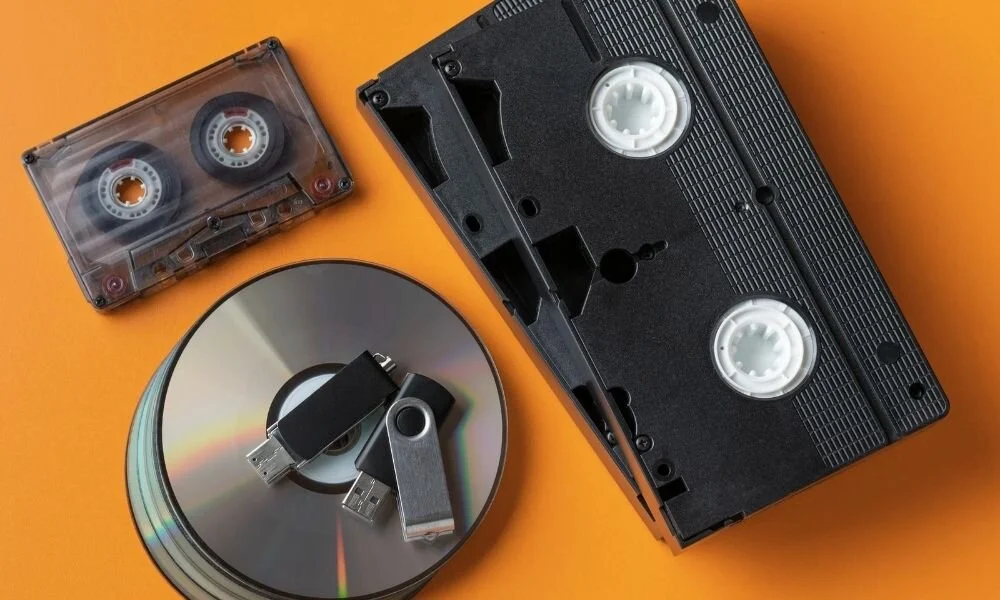Video Formats You Can Transfer To Digital
When you want to conserve your memories for years to come, converting video mediums to digital formats might be the best way to share family memories for generations to come. The video format that you have might not be as out of date as you may think, and you may not have even thought of a couple of the formats that you want to get modernized. Digitizing your old family videos means that you can use those clips for social media or personal projects. If you have trouble thinking of the different videos you can get digitized, we have a generalized list of video formats you can transfer to digital that you can refer to.
Tape Formats
The iconic VHS tape used to be at the heart of every family’s entertainment center. It was used for anything from watching movies to making movies and was eventually used to tape shows off of the television. However, VHS wasn’t the only way to record home videos with tapes. Other, smaller formats like 8 mm format began to take the stage for smaller, handheld camcorders. Ahead, let’s take a look at the various tape video formats you can turn into digital files.
VHS, VHS-C, and S-VHS
If you had any small-scale event, it was likely that, if you got a copy of the recording, it’d be on a VHS. VHS tapes typically had up to 160 minutes of footage, though they could hold 200 minutes in unusual circumstances. The plastic case could easily break, rendering the tape useless. Plus, the footage within is extremely fragile and easily damaged. Professionally recorded movies would be sold on VHS tapes. Often, people would record several different things on one VHS tape. Once a VHS tape is converted to digital, you can edit it into sections for easy-to-watch short videos.
VHS-C and the lesser-known (in the United States) Japanese S-VHS were smaller VHS formats that could fit into smaller camcorders. They look like tiny VHS tapes. These became popular for consumers to use as technology evolved to fit into smaller devices. These tapes could be played in VHS players with the use of a converter, which only added to their popularity. Towards the end of their lifetime, these could only hold up to an hour of footage.
Please be aware, even though it is difficult to find a VHS player, it is not legally possible to convert copyrighted materials to digital unless you are the copyright holder. We at DiJiFi cannot transfer your favorite old movies to a digital format.
Sony Professional Video Cassettes
Different corporations tried to compete with VHS for superiority, though VHS ended up becoming the standard. Sony competed with Betamax and for consumers and created the Betacam tapes. Betacam lasted a lot longer than Betamax until digital recording methods became more popular. Luckily, Sony’s professional video cassettes can be still transferred to digital. If you had one of the defunct methods of recording and can’t find another way to play it back due to this videotape formatting war, transferring it to a digital format could be your lifeline.
Sony also created one of the very first recording video cassette tapes, known as the U-matic. This blocky cassette looks extremely basic but can still be transferred to digital.
DV Format
Sony, Panasonic, and TDK tried their hands at manufacturing a new, digital format that would still be recorded on video cassette tapes. This format would record files onto magnetic film that could be read by and played back on a computer. It was affordable for small budget news journalists and paved the way for the future of video playback and editing. Though the computer software that they once relied on is long gone, they can still be converted to digital.
Disc Formats
The disc revolutionized the video recording industry to become what we know it as today. As the humble DVD moves way to the high-quality Blu-Ray and digital formats, it might be best to save a back-up to a digital format in case of damage.
LaserDisc
Many people consider DVDs in the late 1990s to be the birth of the disc video format, but this isn’t the case. In 1978, the LaserDisc was marketed in Atlanta, Georgia. Unfortunately, the format was slightly ahead of its time, as it was a CD that was about the size of a vinyl record which made it expensive to make. The technology stuck around, however, and even took off in Japan and other wealthy parts of southeast Asia. These discs can still be transferred to a digital format (so long as they aren’t copyright) if you do have your hands on one.
DVD and Mini DVD
During the rise of the CD as a computer storage device in the 1980s and 1990s, the development of video file storage on a disc created the DVD. Being able to store more files on a DVD advanced both the consumer recording industry and the professional recording industry. The higher quality alongside the higher capacity made the DVD a suitable rival for the VHS, eventually overtaking it completely. DVDs are easy for anyone to rewrite with the use of a DVD burner drive for their personal computer, which further jumpstarted novice filmmakers. As camcorders began to use digital memory cards for their storage, DVDs became a natural product for those files to be stored and watched on.
Mini DVDs were essentially the same as DVDs, only with lower storage. Many computers could still play them in their disc drives without issue. Some camcorders recorded directly to mini DVDs. As the DVD format begins to switch to HD-DVD and Blu-Ray, many people stuck to the classic DVD for their projects due to it being easily accessible to everyone. However, DVDs can be extremely fragile and even the smallest of scratches can render them useless, making them a perfect example of video formats you can convert to digital.
Blu-Ray
Yes, even if a video format isn’t obsolete you can still convert it to digital or back it up! Blu-Ray discs, while extremely sturdy, are still able to be scratched and ruined. Transferring your Blu-Ray discs to a digital format or duplicating your Blu-Ray discs helps to prevent the loss of those stored memories. By making use of DiJiFi’s Blu-Ray duplication in NYC, you could save yourself the heartache of lost memories.
If you have questions about your video format that you’d like transferred to a digital format, feel free to inquire with us at DiJiFi. We help clients worldwide to digitize their documents and films and would be happy to answer your questions.


